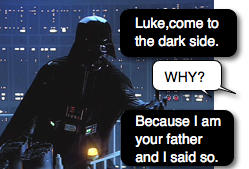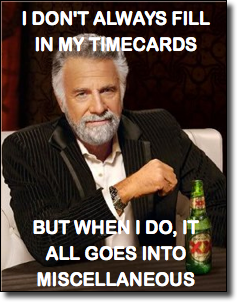 I realized that I had officially become “that” parent when I first uttered the words, “because I said so” to my kids. Growing up, I promised that I would never repeat my mother’s words. I did it anyway.
I realized that I had officially become “that” parent when I first uttered the words, “because I said so” to my kids. Growing up, I promised that I would never repeat my mother’s words. I did it anyway.
I don’t recall the event. It was probably one of the kids asking why they had to take a bath. But, I do remember the emotional tension of feeling both ultimately powerful and a total sell-out.
“Because I said so” is almost always preceded by “Why?” A person asks “why” when they are seeking meaning. They are trying to bridge what they know with something they don’t understand. It usually has an implied counterpoint. “Dad, why is it important that I take my bath right now instead of finishing My Little Pony?” As parents, we should applaud the “why” as it indicates they are seeking understanding.
Unfortunately, the question most likely comes after we have suffered the slings and arrows of work life and a brutal commute home. We know it is going to take time to explain why and in all likelihood they may not agree with our adult logic when we finish. It would be more efficient to tell them, “Because I said so.” The result is going to be the same, regardless. They will take their bath. Why not just cut to the chase?
 Unfortunately many of us confuse the intent of “why.” Instead of seeing it as an opportunity to help provide meaning, we see it as a challenge to our authority. “Clearly, they are asking this because they want to get out of something. How dare they challenge me. I’ll show them who’s boss.” Yes, it is likely they want to get out of honoring the request. It’s because it doesn’t seem to make sense, based on what they know and desire.
Unfortunately many of us confuse the intent of “why.” Instead of seeing it as an opportunity to help provide meaning, we see it as a challenge to our authority. “Clearly, they are asking this because they want to get out of something. How dare they challenge me. I’ll show them who’s boss.” Yes, it is likely they want to get out of honoring the request. It’s because it doesn’t seem to make sense, based on what they know and desire.
We have a lot of situations like this at work. Jill is an amazing former boss of mine – one of my all-time favorites. Jill has a steel trap of a mind. I loved to challenge her logic, because it sharpened my axe. I knew I’d likely go down in flames, but it was worth the educational experience. She also has a big heart. She fully understands and appreciates what motivates people.
There was one situation where we never got to an agreement – timecards. Because we have so many projects going at one time, we have to ensure that we are spending time on the things we said we would. Among other benefits, it allows us to make sure we are making the right investments in future research and not just servicing the urgent projects.
 As you might imagine, timecards are viewed by most as a nuisance. Everyone fills them out because they are mandatory. Our problem was that they weren’t being filled out as accurately as we needed, often dropping things into miscellaneous. People were investing the least amount of time possible because it seemed so unnecessary.
As you might imagine, timecards are viewed by most as a nuisance. Everyone fills them out because they are mandatory. Our problem was that they weren’t being filled out as accurately as we needed, often dropping things into miscellaneous. People were investing the least amount of time possible because it seemed so unnecessary.
My theory was that the associates didn’t understand how the timecards were being used and how that was important to them. They saw it as administrivia, just another way for the man to track me and make sure I am working hard. That wasn’t how we used the tool at all. In fact, the timecards can be the tool that allows them to work on some cool, new innovation project. If they knew how their accuracy could affect them and how that information was being used, I believe they would be take the time to be more accurate.
Jill was ok with that theory, but she felt it was unnecessary to take the time to explain to everyone why it was important. It’s a timecard. Just fill it out and do so accurately. It is part of the job. Somethings don’t need to be explained. These are job obligations.
To me, this was equivalent to “because I said so.” It’s not wrong. In fact, it’s absolutely correct. But, just like my kids’ bath time query, it misses an opportunity. “Because I said so” works for that moment, but it doesn’t stick for long. They will likely ask “why” again next time we are faced with the same situation.
We have a greater chance of making things stick if we take the time to provide the context of “why.” Context and meaning last a long time. They remove the cognitive dissonance that causes us to challenge the request every time, or to perform the mandatory task in a substandard fashion. “Why” gives us a desire to do something and to do it well. But it takes time and the right perspective. We have to make the time and then see the question of why as a search for understanding rather than a challenge to our authority
Answering “why” is rarely efficient in the moment, but, it is very effective in the long run.






